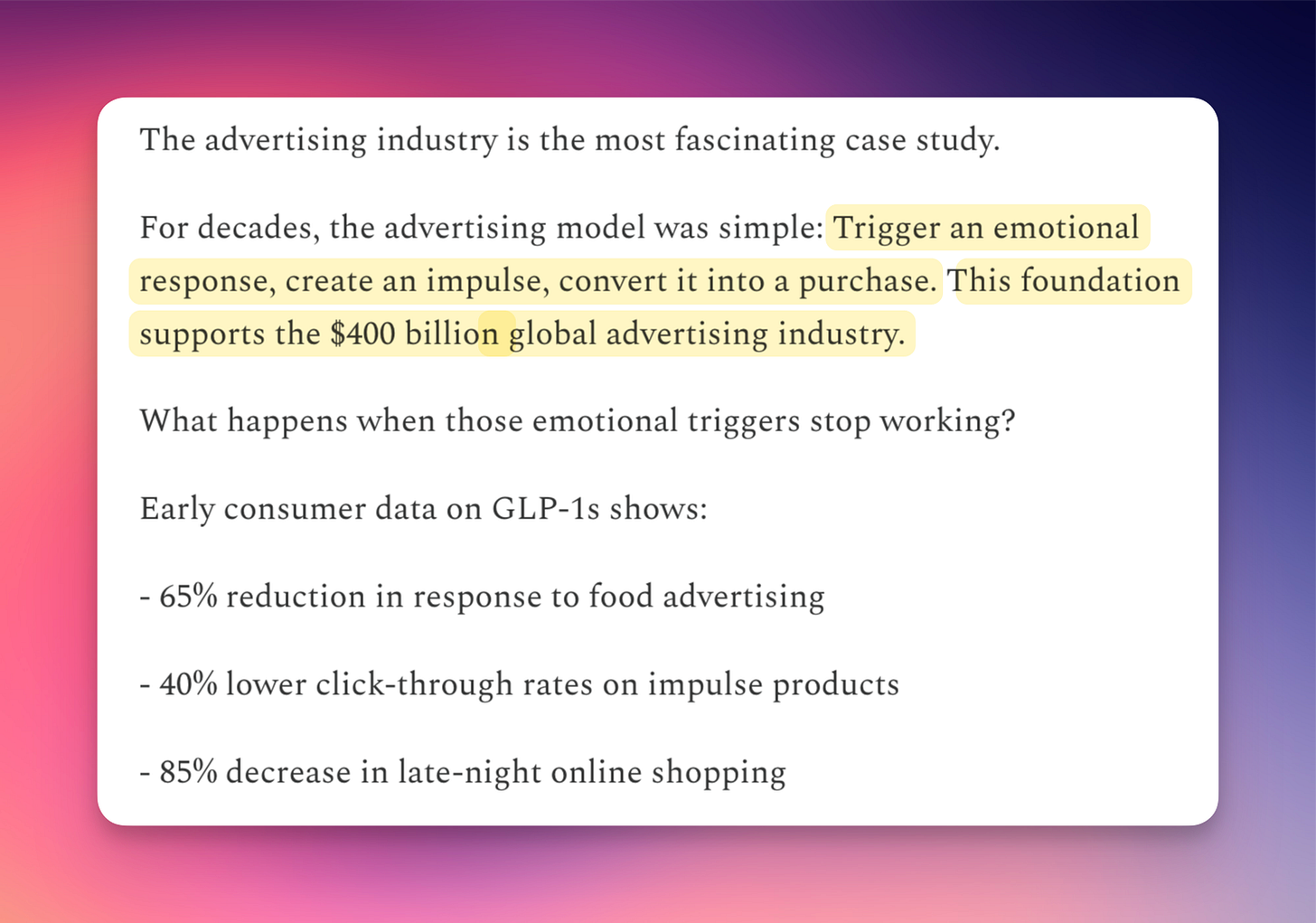Are Marketer's Ready for This?
The market disruptor creators didn't see coming
One of my favorite sayings when I’m learning or have learned something new is, “You can’t unring a bell.”
Meaning that once you see something differently, you can’t really “unsee” it.
You will forever have a different perspective (probably goes hand in hand with “ignorance is bliss” 😉).
I recently read an article that made me see marketing's future in a whole new light… and I think that’s a good thing.
The crazy part of the article (I will share it below) was that I wasn’t sure where it was going (which is pretty fun - my curiosity and good writing kept me reading) and don’t think that I would have connected these dots without reading this (as obvious as it seems after the fact).
It was an article about an economic earthquake (don’t worry - this isn’t political).
It’s about something that has made a massive impact on the economy, not just in a “first-order effect,” as the author says, but in the “second and third-order effects.”
What is the “thing” that is having such a huge impact?
GLP-1 medications.
Used for weight loss, but also (and how this impacts marketers) impulse control.
The article I’m referencing, which is outstanding and worth reading, is “The $100 Trillion Disruption: The Unforeseen Economic Earthquake” by Wildfire Labs Substack.
I won’t go into a bunch of detail about the medication and the impact it’s already having from an economic standpoint (it’s all in the article), but let’s talk about what this means for the marketers who rely on a lack of impulse control to sell to people.
In other words, the tactics many marketers have used and relied on to increase sales are becoming less effective. 👇
(The screenshot below was taken from the Wildfire Labs article.)
“Madison Avenue is quietly panicking. One major agency (which asked not to be named) estimates that 50% of their current advertising strategies will be obsolete by 2027. They are right to worry.
Here's the plot twist: A new marketing economy is emerging while traditional advertising declines.”
-Todd Gagne
40% lower click-through rates on impulse products!
This doesn’t just apply to e-commerce sales.
If consumers have more impulse control over what they spend their money on, they will be much less likely to think they “need” someone’s $2k course or high-ticket mastermind that promises the moon and the stars and is the solution to all their business problems.
I’m being a little dramatic here with the moon and the stars and solving all their business problems. But don’t you think if people have more impulse control, they’re certainly going to be more discerning when it comes to whether or not a product/book/coach/mastermind is really what they need?
If I were a betting person, I’d bet that the old scarcity standards in internet marketing are becoming less effective every day.
This is probably due to a combination of factors (market sophistication, the economy as a whole, the broad level of distrust, etc.) - but with the estimated predictions of the increase in the use of GLP-1 medications over the coming years, I think we’re in for some significant changes in this space.
And that’s a good thing.
“The pattern here isn't just about decline; it's about transformation.”
-Todd Gagne
For creators who don’t feel the need to add fake scarcity, irrelevant upsells (the keyword being ‘irrelevant’), or nonsensical bonuses, your work will stand out more.
Your core business philosophy has always been solving problems for real people, and you want to feel good about yourself along the way.
The journey matters.
The process is important.
The article also addresses the dark side of GLP-1 medications (not health side effects, which, as of now, are minimal compared to the benefits).
They automatically create a division between people who want and can afford them and people who want them and can’t.
Because the people who can afford them (until there’s a time when these medications are covered by insurance in the US - but in a system that makes more money off of people being sick, I’m not holding my breath) tend to have higher productivity, which in turn means more opportunity (I’m simplifying what was said in the article).
What I *think* might happen in the creator/digital marketing space is that as people have more impulse control and are more discerning, we may see a higher marketing standard emerge.
A subset of people created all the rules and fundamentals we have of marketing and advertising (think Madison Avenue in the 50s - i.e., MadMen). All men and, for the most part, all white men (not picking on anyone here, just stating a fact).
The idea that there couldn’t possibly be another way to do things (less psychological triggers and tactics) is silly (or stubborn?).
We’ve been socialized and conditioned by advertisers.
If advertisers' conditioning stops being effective, they have to find a new approach.
There’s never been a better time to be a business owner with integrity (of course, it’s always been the ‘right time’ to have integrity).
That doesn’t mean we don’t need to understand how to write good copy and make sales.
It just means it may look very different.
Suggestion:
See if you can spot trends or shifts from companies you’ve done business with and/or followed (the author gives a few examples of some big companies and what they’re doing).
The rise of Substack is a perfect example.
People are more discerning about where they spend their time and the platforms they support.
Since the transformation we see happening (per the author) is not based on industry but on human behavior, we are bound to be heading into something completely different.
I, for one, think it’s incredibly exciting.
*If this resonated with you, let me know what you think. What spoke to you?
*Read “The $100 Trillion Disruption: The Unforeseen Economic Earthquake” by Todd Gagne here.*





So much to digest here…very thought-provoking. I am hopeful that my own propensity for just being myself, sharing my expertise, and enjoying connection will serve me even better in the “post impulse-driven” economy.
This is such an interesting perspective on what might unfold and why. It wouldn't be the first time that a medication has had an unexpected ripple effect. My question is, do we need to "fix" our impulse control, or should we look deeper at why it's become a problem? We're mentally drained from being online 24/7, but it's so damn hard to put down those phones and be present in our own lives. Shutting out the noise might be the best medicine of all (not to detract from the real benefits that medication has on our lives).